
Marilyn Jeanne Seely is an American singer, songwriter, record producer, actress and author. Most notably identified with the country music genre, Seely found success with the Grammy Award-winning song "Don't Touch Me" (1966). Her soul-inspired vocal delivery gave her the nickname of "Miss Country Soul". Seely is also known for her membership and presence on the Grand Ole Opry, having appeared more times on the program than any other performer.

Jan Howard was an American author, as well as a country music singer and songwriter. As a singer, she placed 30 singles on the Billboard country songs chart, was a Grand Ole Opry member and was nominated for several major awards. As a writer, she wrote poems and published an autobiography. She was married to country songwriter Harlan Howard.
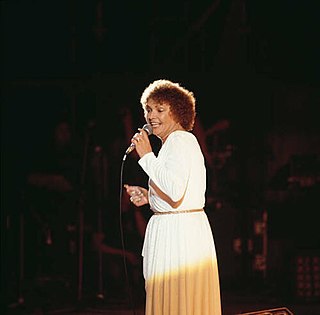
Billie Jo Spears was an American country music singer. She was known for a series of singles whose characters often represented women in assertive positions. Among these recordings was a song about sexual harassment, and a song about rekindling sexual desire ".
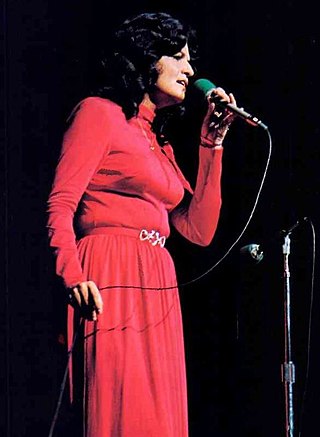
Jeanne Pruett is an American country music singer and songwriter. She also has credits as a published author. Pruett had several major hits as a music artist, but became best-known for 1973's "Satin Sheets". The song topped the country music charts and helped her secure a membership in the Grand Ole Opry cast.

"Don't Touch Me" is a song written by Hank Cochran. It was originally written for and recorded by American country artist Jeannie Seely. The song was released as a single on Monument Records in March 1966 and became a major Billboard country hit. "Don't Touch Me" became Seely's signature song and her biggest hit as a solo artist. It would later appear on her debut studio album and be re-recorded by Seely in later years.

The discography of American country artist Jan Howard contains 17 studio albums, six compilation albums, 51 singles, one box set, two other charted songs and 12 additional album appearances. Her recordings were issued as singles beginning in 1958. The first to chart was issued by Challenge Records called "The One You Slip Around With". Released in 1959, it rose into the US Hot Country Songs top 20. It was followed by two duets with Wynn Stewart, including the chart record "Wrong Company". Howard's debut studio album, Sweet and Sentimental, featured dual credit with The Jordanaires and was issued by Capitol Records in 1962. In 1963, "I Wish I Was a Single Girl Again" reached the top 30 of the US country songs chart.
"Rose Garden" is a song written in 1967 by American singer-songwriter Joe South. It was first recorded by Billy Joe Royal on his 1967 studio album Billy Joe Royal Featuring "Hush". Versions by South himself and Dobie Gray appeared shortly after the original. Gray's version became a minor hit in North America in 1969.

"I Want to Go Where No One Knows Me" is a song written by Kenneth Grant and Jerry Jericho. It was originally recorded by American country singer Jean Shepard. Released as a single in 1958, it reached the top 20 of the US country chart.

"Second Fiddle (To an Old Guitar)" is a song written by Betty Amos that was originally recorded by American country singer Jean Shepard. It was released as a single by Capitol Records in 1964, reaching the top five of the US Country chart. The song featured Shepard yodeling and was her first top ten single in ten years. The song would later be nominated by the Grammy Awards.
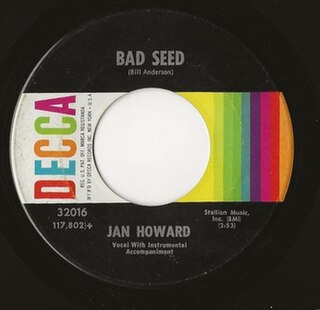
"Bad Seed" is a song written by Bill Anderson that was originally recorded by American country artist Jan Howard. Released as a single by Decca Records, it was the second top ten song on the US country chart in Howard's career. It was given reviews by Billboard, Cash Box and Wide Open Country.

"My Son" is a song written and recorded by American country music singer Jan Howard. It is among several songs recorded by country artists during this period that related to the Vietnam War. The song is based on a letter Howard wrote to her son, Jimmy, who was drafted into the war. After writing the letter, she was inspired by family and friends to put it to music. Recording the song in a single take, it was released as a single in 1968.

Sweet and Sentimental is the debut studio album by American country artist Jan Howard. Credit was also given to the album's backing group The Jordanaires. It was released by Capitol Records in October 1962 and consisted of 12 tracks. The album was originally meant to be issued on Howard's former record label until it was bought by Capitol. After several setbacks recording the album, the project was finished under the production of Ken Nelson. It received a positive response from Billboard magazine following its release.
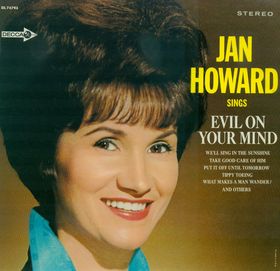
Jan Howard Sings Evil on Your Mind is a studio album by American country artist Jan Howard. It was released in July 1966 by Decca Records and was her second studio album. The project consisted of 12 tracks featuring both uptempo and ballad material. Its title track was a top five US country song in 1966 and was one of four singles on the album. Another was the charting 1964 song "What Makes a Man Wander?". The album itself made the US country survey following its release and received critical reception from Cash Box magazine.

Bad Seed is a studio album by American country music artist Jan Howard. It was released in November 1966 via Decca Records and featured 12 tracks. The third studio album of her recording career, Bad Seed was named for its title track, which reached the top ten of the country charts in 1966. The disc was met with a favorable review from Cashbox following its release.
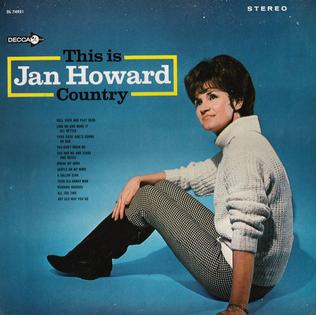
This Is Jan Howard Country is a studio album by American country artist Jan Howard. It was released in November 1967 by Decca Records and contained a total of 12 tracks. The album was the fourth released in Howard's career, featuring both uptempo tunes and ballad songs. Along with cover tracks were also new recordings. This included two single releases that made the US country top 40: "Any Old Way You Do" and "Roll Over and Play Dead". The album itself made the US country albums top ten list. It received positive reviews from both Billboard and Cash Box magazines.

Count Your Blessings, Woman is a studio album by American country music artist, Jan Howard. It was released in June 1968 on Decca Records and contained 11 tracks. Most of the disc featured covers of popular songs of the era. The album's title track was spawned as a single, becoming a top 20 song on the Billboard country chart in 1968. Additionally, the album would reach peak positions on the American country albums chart. It was reviewed positively by Billboard magazine.
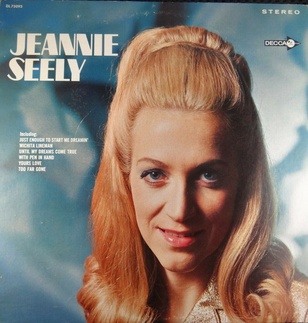
Jeannie Seely is an eponymous studio album by American country artist Jeannie Seely. It was released by Decca Records in April 1969 and was her fifth studio album. The 11-track collection featured songs written by Hank Cochran and others. Many of the songs were cover tunes, with some exceptions such as "Just Enough to Start Me Dreamin'". The latter was the album's only single and made an appearance on the US country chart in 1969. The eponymous release was Seely's first for the Decca label and received reviews from Billboard, Cash Box and Record World magazines.
"What Makes a Man Wander?" is a song written by Harlan Howard that was originally recorded by his wife and American country artist Jan Howard. Released as her first single for Decca Records, it made the top 40 of the US country chart in 1965. It was later released on her 1966 studio album Jan Howard Sings Evil on Your Mind.
"Any Old Way You Do" is a song written by Harlan Howard that was originally recorded by his wife and American country artist Jan Howard. Released as a single by Decca Records, it rose into the US country top 40 in 1967 and was later issued on her studio album This Is Jan Howard Country. It was given positive reviews by music publications following its release.
"Roll Over and Play Dead" is a song written by E. Rich that was recorded by American country artist Jan Howard. Released as a single by Decca Records, it placed in the top 40 on the US country songs chart in 1967. The song was given positive reviews from music publications following its release and was later included on Howard's studio album This Is Jan Howard Country.
















